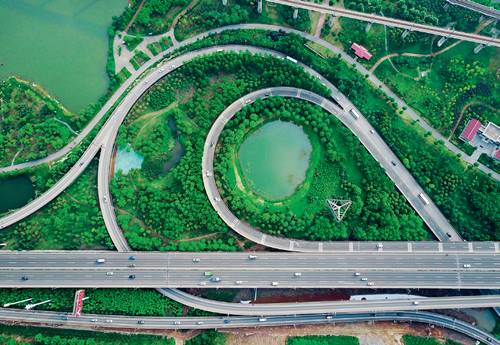Xi promises 'greatness' with Chinese characteristics
- By Haifa Said
 0 Comment(s)
0 Comment(s) Print
Print E-mail China.org.cn, October 23, 2017
E-mail China.org.cn, October 23, 2017
 |
|
China's GDP rises from 54 trillion yuan to 80 trillion yuan (about US$12.1 trillion) over the past five years, keeping its position as the world's second largest economy. [File photo] |
In his long and confident speech at the milestone 19th National Congress of the Communist Party of China (CPC), General Secretary of the CPC Central Committee Xi Jinping gave a broad outline for bringing back the glory to China through elevating socialism which Chinese characteristics to a new level that will see China "moving to center stage" in the international arena.
A key word in Xi's speech, which ran for more than three hours, was "great," implying grand ambitions to move from the stage of modernization to building "a great modern socialist country that is prosperous, strong, democratic, culturally advanced, harmonious, and beautiful."
The first stage of hard work extending until 2035 will build on the firm foundation of China as a "moderately prosperous society" after the phenomenal success of shaking poverty off over 60 million Chinese citizens since the 18th CPC National Congress in 2012.
China's GDP rose from 54 trillion yuan to 80 trillion yuan (about US$12.1 trillion) over the past five years, keeping its position as the world’s second largest economy.
However, "moderately prosperous" seems in no way enough for the CPC with Xi Jinping at its core. A further 15-year strive until the middle of the 21st century is required to realize the "Chinese Dream" of national rejuvenation by maintaining national strength and wielding international influence.
The CPC’s recipe is to follow a Chinese-styled model that takes into consideration the requirements of the Chinese society and the challenges it faces, mainly the “acute” problem of unbalanced and inadequate development as 43 million people continue to suffer from extreme poverty.
Acknowledging the people’s aspirations for “a better life,” Xi laid focus on high quality and effectiveness, but not "growth at all costs," as key prerequisites to achieve economic development and compete on the world level, while investing in the real economy and utilizing and upgrading the assets and resources created in the country.
This approach would help secure a more sustainable national development line with growing high-quality production to create more material and cultural wealth for the people, in parallel with continuing anti-poverty measures to realize the principle of equality for all.
Xi didn't lose sight of the fact that increasingly prosperous people will have increasing demands for democracy, rule of law, fairness and a better environment.
And here stands the strengthened role of the anti-graft campaign that has brought down more than a million officials at all levels, with Xi pledging that the fight against corruption will never end as it is a threat to achieving the desired goals.
The making of a "great" China in the CPC's view demands addressing environmental issues as well, especially in light of the continued pollution challenge. Building a "beautiful" country with a clean environment and green and low-carbon economy is a must to maintain popular pride.
In a country where an increasingly number of people depend on diversified information and communication technologies in various aspects of their life, harmonizing modernization with culture and boosting the appeal of civilization, one of the oldest in the world, is a matter of great importance which Xi highlighted in his road map for rejuvenation.
Heralding "a new era" towards more socialist achievements and power, President Xi presents a model for other countries who want to speed up their development while maintaining their independence.
Through his trademark pro-Eurasian “Belt and Road” project and his promise at the Congress to ease access to the Chinese market for foreign investors, Xi supports international cooperation and encourages joint global work in a favorable win-win business environment, while at the same time solidifying Chinese economic and political influence.
Haifa Said is chief editor of the English Department at the Syrian Arab News Agency.
Opinion articles reflect the views of their authors, not necessarily those of China.org.cn.






Go to Forum >>0 Comment(s)